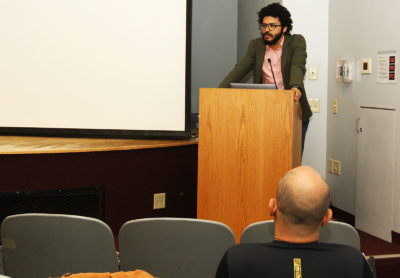
In Brazil — a country rich with culture and art — issues of creating and supporting filmmakers have arisen. However, the country’s largest film festival is working to change that.
Mostra do Filme Livre, otherwise known as the Brazilian Free Spirit Film Festival, made its debut at the Boston University College of Communication last Friday. The three-day festival, which has been running since 2002, presented films from Brazilian veterans like Júlio Bressane and newcomers Valentina Homem and Arthur Tuoto.
“We think it’s going to be interesting to show what’s going on in Brazil in the independent movies because the festival focuses on the films made without money [and] without sponsors,” said Guilherme Whitaker, the director of the festival.
The 10 movies, all short and full-length, were chosen based on their award-winning status, as well as the overarching themes they presented.
“It’s an opportunity to try to access [Brazilian] culture, and the contradictions of that culture,” said Rodrigo Lopes de Barros, a Spanish and Portuguese professor at BU. “Beyond that, I think the films are also very universal even though most are centered on the Brazilian condition.”
Lopes de Barros was Whitaker’s main contact in organizing the festival in Boston, as his award-winning documentary, “Chacal: Proibido Fazer Poesia,” previously premiered at the festival.
Lopes de Barros said BU is a place where film culture thrives. He said he also believes the university has a tradition of hosting events related to Latin American film.
The festival is an opportunity for students and Bostonians to learn about Brazil and Brazilian cinema, Whitaker said. He also explained that Brazilian film schools are scarce, and the media industry isn’t as established with equipment exponentially more expensive.
He noted that due to the economic limitations of Brazilian cinema, films tend to differ from those stereotypically associated with U.S. cinema. An example of this is that many movies tend to have strong political themes and messages, he said.
“In Brazilian cinema, there was this discussion about how to make cinema in the third world [and] how to make films in the underdeveloped country,” Lopes de Barros said. “I think this film festival is in the direction of trying to understand how to make cinema, which is a very sophisticated form of art, in a country that has so many economical and political shortcomings.”
Whitaker mentioned another issue plaguing Brazilian cinema — the closure of street cinemas. He explained that instead of movie theaters inside of malls, street cinemas are independent and are more likely to show films that aren’t as mainstream.
However, many of these cinemas in Brazil are bought out and replaced by churches, which Whitaker views as a major problem. In fact, Whitaker said that the theme of last year’s Mostra do Filme Livre revolved around protesting this phenomenon via themed panels, director debates and strategic graphic design.
“Every country has a lot of problems, but over there, we have [had] a lot of problems for a long time and today we’re dealing with a very big depression,” Whitaker said. “The situation there is very sad, unfortunately.”
The films also deal with issues outside of the country, mainly that of Brazilians living abroad. Whitaker and Lopes de Barros find these particularly applicable to the city of Boston, which is home to a large Brazilian community, according to the Boston College Department of History.
“Perspective is everything, and in order to understand other people you need to be exposed to other cultures,” Christina Lamagna, a COM freshman, said. “It enhances your understanding of the world, and I think through art and through film is a wonderful way to do that.”
The festival curator plans to make the festival an annual event at BU and will consider creating a similar mini-festival in Montreal.
“We are making a part of a festival in your country, the most important country in the world, so it’s very important to the people that make the films and to us that make the event,” Whitaker said. “[Mostra do Filme Livre] is my life. It’s not just a hobby.”























































































































